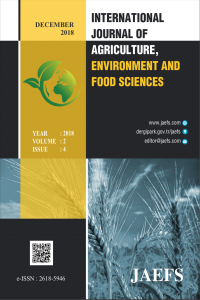Abstract
References
- Alkan, H. I. (2006). Comparative Economic Analysis of Hazelnut Growing in the Plain and High Sections of Samsun province of Terme district, OMÜ Institute of Sciences, M.Sc. Thesis, Samsun.
- Anonymous, (2005). Medicinal and Aromatic Plants Working Group-ECP/GR.
- Anonymous, (2011). TSI (Turkey Statistical Institute Data base).
- Sıray, E., Duyar, Ö., Özdemir, F., Ertekin, F. (2012). Determination of Education and Publication Infrastructure Needs in Hazelnut Growing in Western Black Sea Region. Journal of Agricultural Faculty, 2012, 29 (2), 9-18, Giresun.
- Bayram, E., Kırıcı, S., Tansı, S., Yılmaz, G., Arabacı, O., Kızıl, S., Telci, Đ. (2010). "Possibilities of Increasing Production of Medical and Aromatic Plants". Turkey Agricultural Engineering Technical Conference Proceedings Book-I, 437–456, 11– 15 Ocak, Ankara.
- Sıray, E., Akçay, Y. (2010). A Research on the Determination of Economic Analysis, Production and Marketing Problems of Hazelnut-Growing Enterprises in Giresun Central District. GOU Faculty of Agriculture Magazine, 27(1).
Abstract
In this study, it was
investigated whether medicinal and aromatic plants can be an alternative to
hazelnut cultivation, by direct interview method on 154 people living in the
Western Black Sea Region (Düzce, Sakarya, Zonguldak and Bartın), which produces
hazelnut by 27% of Turkey. 154
students were surveyed by using Neyman method. Likert scale was used to measure
whether the medicinal and aromatic plants could be alternative to hazelnuts and
the results were evaluated by SPSS method. In our study, 154
people with different professions (farmers, civil servants, workers, retired,
students and unemployed), different educational levels (literacy, primary
education, secondary education, high school and university) and different
income levels were included in the survey. As a result of the study, 97.4% (including 92.2% of those who grow
hazelnuts) want to grow medicinal and aromatic plants as an alternative to
hazelnuts. 97.4% of medicinal and aromatic plants are considering to grow
linden and black sesame. There are also people, at a rate of 81.8%, who think
that medicinal and aromatic plants are organic and 66.2% of them also think
that organic certification should be obtained for
cultivation. 24.7% of them use
medicinal and aromatic plants as an alternative to medicines when they are
sick. As a result, medicinal and aromatic plants are
important in our lives as an alternative to medicines. Considering the importance of alternative plants
in the future, it is seen that in the Western Black Sea Region, even if at
limited number, there is a tendency towards medical and aromatic plant farming
besides hazelnut farming.
References
- Alkan, H. I. (2006). Comparative Economic Analysis of Hazelnut Growing in the Plain and High Sections of Samsun province of Terme district, OMÜ Institute of Sciences, M.Sc. Thesis, Samsun.
- Anonymous, (2005). Medicinal and Aromatic Plants Working Group-ECP/GR.
- Anonymous, (2011). TSI (Turkey Statistical Institute Data base).
- Sıray, E., Duyar, Ö., Özdemir, F., Ertekin, F. (2012). Determination of Education and Publication Infrastructure Needs in Hazelnut Growing in Western Black Sea Region. Journal of Agricultural Faculty, 2012, 29 (2), 9-18, Giresun.
- Bayram, E., Kırıcı, S., Tansı, S., Yılmaz, G., Arabacı, O., Kızıl, S., Telci, Đ. (2010). "Possibilities of Increasing Production of Medical and Aromatic Plants". Turkey Agricultural Engineering Technical Conference Proceedings Book-I, 437–456, 11– 15 Ocak, Ankara.
- Sıray, E., Akçay, Y. (2010). A Research on the Determination of Economic Analysis, Production and Marketing Problems of Hazelnut-Growing Enterprises in Giresun Central District. GOU Faculty of Agriculture Magazine, 27(1).
Details
| Primary Language | English |
|---|---|
| Subjects | Agricultural Engineering |
| Journal Section | Research Articles |
| Authors | |
| Publication Date | December 20, 2018 |
| Submission Date | May 16, 2018 |
| Acceptance Date | October 5, 2018 |
| Published in Issue | Year 2018 Volume: 2 Issue: 4 |
Abstracting & Indexing Services
© International Journal of Agriculture, Environment and Food Sciences
All content published by the journal is licensed under a Creative Commons Attribution-NonCommercial 4.0 International License (CC BY-NC 4.0).
This license allows others to share and adapt the material for non-commercial purposes, provided proper attribution is given to the original work.
Authors retain the copyright of their articles and grant the journal the right of first publication under an open-access model
Web: dergipark.org.tr/jaefs E-mail: editorialoffice@jaefs.com Phone: +90 850 309 59 27

